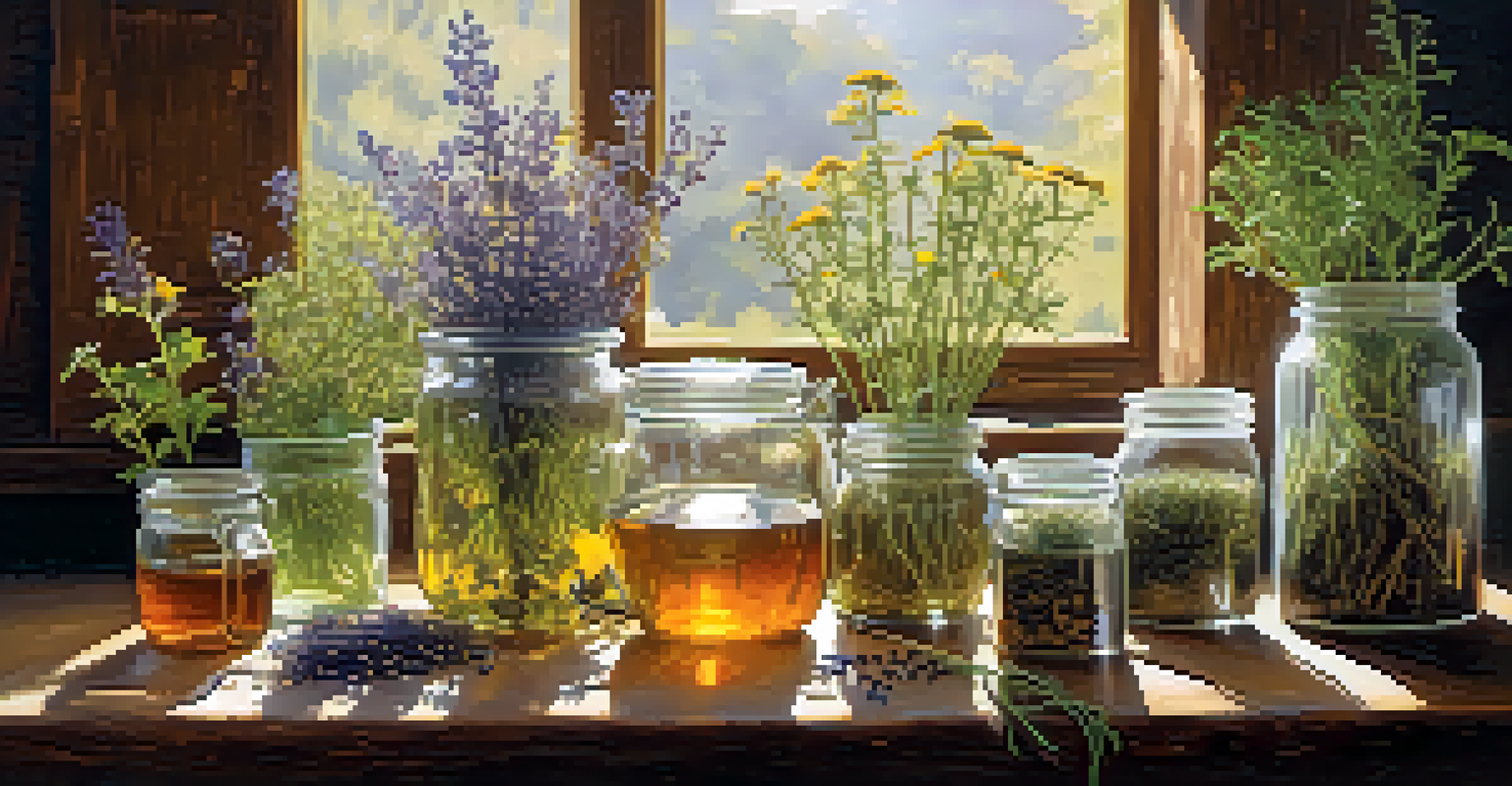Homeopathy vs. Herbalism: Understanding the Differences

Defining Homeopathy: A Unique Healing Approach
Homeopathy is a system of alternative medicine that uses highly diluted substances to trigger the body's natural healing processes. Founded in the late 18th century by Samuel Hahnemann, it operates on the principle of 'like cures like,' suggesting that substances that produce symptoms in healthy individuals can be used to treat similar symptoms in the sick.
Homeopathy is like a tiny miracle in a bottle, where the essence of nature works in harmony with our body’s innate healing powers.
One of the defining features of homeopathy is its reliance on extreme dilutions, often to the point where no molecules of the original substance remain. This may sound counterintuitive, but proponents believe that the water retains a 'memory' of the substance, allowing it to stimulate healing.
Homeopathic treatments are tailored to each individual, taking into account not only the physical symptoms but also emotional and psychological states. This holistic approach is what many find appealing, as it considers the whole person rather than just the illness.
Understanding Herbalism: Nature’s Pharmacy
Herbalism, on the other hand, is the practice of using plants for medicinal purposes. This ancient healing method encompasses a wide range of practices, from using herbs in cooking to crafting tinctures and teas for health benefits. Unlike homeopathy, herbalism often utilizes the whole plant or specific parts, such as leaves, flowers, roots, or seeds.

Herbalists believe in the therapeutic properties of plants and often base their treatments on traditional knowledge passed down through generations. For instance, chamomile is commonly used for its calming effects, while ginger is known for its ability to aid digestion.
Homeopathy Uses Diluted Remedies
Homeopathy relies on highly diluted substances to stimulate the body's natural healing processes, based on the principle of 'like cures like.'
While herbalism can be more straightforward than homeopathy, as it involves using actual plant materials, it also requires a deep understanding of botany and the appropriate dosages. This knowledge can help avoid potential adverse effects and ensure the herbs are used safely and effectively.
Key Principles: How They Differ
The fundamental difference between homeopathy and herbalism lies in their underlying principles. Homeopathy focuses on the concept of 'like cures like' and uses minuscule doses of remedies to stimulate the body's healing mechanisms. In contrast, herbalism relies on the natural properties of plants, using them in higher concentrations to promote health and wellness.
Herbalism is humanity's oldest form of medicine, where the natural world offers us the remedies we need to heal and thrive.
Homeopathic remedies are often highly diluted and prepared through a process of succussion (vigorous shaking), which many believe enhances their healing properties. Meanwhile, herbal remedies are typically more concentrated, utilizing the potency of the plant material without the significant dilution seen in homeopathy.
This distinction in principles not only affects how each practice is applied but also influences the conditions they are often used to treat. Homeopathy may be favored for chronic ailments or emotional issues, while herbalism might be more beneficial for acute conditions like colds or digestive problems.
Treatment Methods: Different Approaches
When it comes to treatment methods, homeopathy and herbalism take distinct paths. Homeopathic practitioners usually conduct a comprehensive interview to understand a patient's physical and emotional health before prescribing personalized remedies. This process can feel quite intimate and tailored to the individual's unique needs.
On the other hand, herbalists often focus on specific herbs that target the symptoms presented by the patient. They might recommend teas, capsules, or tinctures based on the herbs' traditional uses and therapeutic effects, making it a more straightforward approach for many.
Herbalism Utilizes Whole Plants
Herbalism employs various parts of plants for medicinal purposes, focusing on their natural properties and traditional uses to promote health.
While both methods emphasize natural healing, the way treatments are formulated and delivered can vary significantly. This difference can influence a person's preference for one method over the other, depending on their comfort level and health philosophies.
Scientific Support: Evidence and Research
The scientific community has approached homeopathy and herbalism with varying degrees of scrutiny. Homeopathy has faced significant criticism due to a lack of empirical evidence supporting its effectiveness, with many studies suggesting that any benefits may stem from the placebo effect rather than the remedies themselves.
Conversely, herbalism has garnered more attention in research, with certain herbs showing promising results in clinical studies. For example, studies have found that turmeric and its active ingredient, curcumin, possess anti-inflammatory properties, making them valuable in treating various health issues.
While both fields face their share of skepticism, the growing interest in natural health solutions has led to an increase in research for herbalism. This momentum provides a stronger foundation for herbal remedies within the medical community, compared to the often-controversial standing of homeopathy.
Regulations and Safety: Navigating the Landscape
The regulatory landscape for homeopathy and herbalism also differs significantly. In many countries, homeopathic remedies are subject to specific regulations and may need to meet certain standards before being marketed. However, the lack of rigorous testing can lead to variability in product quality.
Herbalism, while also facing regulation, tends to be less standardized. This means that consumers should exercise caution when choosing herbal products, as the quality can vary widely between brands and formulations. It's essential to seek out reputable sources and consider consulting with a healthcare professional.
Choosing the Right Approach Matters
Selecting between homeopathy and herbalism depends on individual health needs, preferences, and the nature of the condition being treated.
Understanding the regulations and safety concerns for both practices is crucial for anyone interested in exploring these alternative therapies. Being informed can help individuals make better choices and avoid potential risks associated with unregulated products.
Choosing Between Homeopathy and Herbalism
Deciding between homeopathy and herbalism can be a personal journey. Many people may gravitate towards one approach based on their health needs, preferences, or even philosophical beliefs about healing. For instance, someone seeking a tailored, individualized treatment might find homeopathy appealing, while another looking for straightforward natural remedies might prefer herbalism.
It's also worth considering the nature of the health condition being addressed. Homeopathy may be suitable for chronic or complex conditions, while herbalism can offer quick relief for acute issues. Understanding the nuances of each practice can help individuals choose the right path for their health.

Ultimately, the choice may involve experimenting with both methods and seeing which resonates more with one's body and mind. Consulting with qualified practitioners from both fields can provide additional insights and guide individuals toward the best approach for their unique health journey.